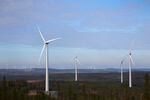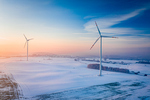European electricity: long-term, renewables-based power purchase agreements transform sector
Scope Ratings says the surging demand for PPAs represents a profound shift in risk-bearing in the sector: from operators of unregulated renewable energy power plants (utilities, independent power producers and financial investors), on the one hand, to so-called off-takers, on the other. Besides energy suppliers, owners of generation assets increasingly find direct buyers with energy-intensive corporates.
“For the seller of electricity under a PPA, the PPA can be considered a tool of risk transformation,” says Sebastian Zank, analyst at Scope. “For the off-takers, the long-term visibility on energy procurement, potential for profit associated with PPAs and reputational benefits offset the extra risk they take on,” Zank says.
“We believe the overall impact of PPAs for sellers and off-takers is credit-supportive,” he says. However, the overall impact depends on the specifications of used PPAs and the impact on a seller’s revenue and margin recognition or an off-taker’s raw material procurement strategy.
PPAs do, however, introduce significant counterparty and forecasting risk because the contracts are complex, non-standardised transactions between a buyer and a seller unlike hedging transactions for conventional sources of electricity which typically take place on power exchanges or through short-term contracts.
The primary catalysts for PPA take-up in Europe are the phasing out of subsidies for newly installed wind and solar assets across Europe and the achievement of “grid parity” in many countries whereby solar- and wind-powered electricity generation has become competitive on price with coal, gas and nuclear power.
Owners of unregulated renewable energy assets/projects - such as Encavis, Energparc, Energiekontor, Neoen, Akuo - renewables divisions of large European utilities or financial investors – such as Octopus Investments, Aquila Capital, Greencoat Capital, Luxcara - have a natural interest to hedge electricity sales over a longer time horizon. Such long-term hedges in the form of PPAs are already well established with off-takers such as energy traders or utility incumbents, for example: Engie, Vattenfall, Axpo, Alpiq, Uniper among others.
Extra demand for PPAs is increasingly coming from industrial and corporate consumers, particularly energy-intensive companies. Aluminium supplier Alcoa, steelmaker ArcelorMittal and state railway companies Deutsche Bahn and SNCF are among those with PPAs in Europe wanting to procure environmentally friendly power supplies which they can use to burnish their “green credentials,” hence recent PPAs with renewable-energy suppliers.
The global market for corporate PPAs with direct consumers of electricity is set for a new global high this year, with the 13 GW contracted in the first nine months of the year already at the level of mid-to-long-term PPAs signed for all of 2018 – itself a record year - with much of the growth in the Americas.
Europe is catching up: “We expect continued strong growth in Europe judging by recent corporate PPAs struck in Q3 2019,” says Zank.
PPAs in EMEA, primarily Europe, will likely cover a renewables capacity of around 3 GW of electricity this year, up 30% from 2018. And this volume comes on top of the PPA signed between sellers and energy suppliers which is estimated at a volume of between 7 and 10 GW per annum (source: Pexapark).
Another shift related to the rise in use of PPAs is the growing competition that the trading/supply businesses of incumbent European utilities face from smaller competitors. Consumers can directly procure energy volumes directly from the generator without an intermediary and newcomers, such as the energy-supply arm of British Octopus Energy, or smaller energy suppliers, such as Audax Renovables or Factorenergia, can source electricity using PPAs struck with individual renewable-energy projects or other utilities without necessarily having generating assets of their own.
“In doing so, they can take on the trading and even retail operations of the incumbents,” says Zank.
To read the full report and charts, please follow this link.
- Source:
- Scope Ratings
- Author:
- Press Office
- Link:
- www.scopegroup.com/...
- Keywords:
- Scope Ratings, PPA, long-term, renewable energy, electricity, sector, power purchase agreement, analyst, benefit, Europe


























